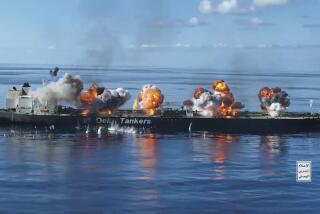Iran Warship Chased Off by Convoy in Gulf
- Share via
MANAMA, Bahrain — U.S. helicopters and warships escorting Kuwaiti tankers out of the Persian Gulf chased away an Iranian warship Monday in the first major confrontation of the U.S. convoy operation, witnesses said.
The mine-damaged supertanker Bridgeton and three smaller reflagged Kuwaiti tankers in the convoy later cleared the Strait of Hormuz, gateway to the gulf, and a new convoy of three U.S.-escorted tankers steamed through the strait and into the strategic waterway.
In a separate incident, crewmen aboard a U.S. Navy destroyer fired a machine gun across the bows of two dhows that approached the outbound convoy.
Britain May Join Effort
In Washington, the State Department said that Britain will re-register at least one Kuwaiti oil tanker, joining the United States in affording the Kuwaiti vessels naval protection from possible Iranian attack. However, a spokesman for Britain’s Transport Department denied knowledge of any Kuwaiti application for re-flagging.
From a Navy UH-1 helicopter circling over the gulf, Richard Pyle, an Associated Press reporter covering the escort operation, said the approach of the Iranian warship prompted what looked like a full-scale naval maneuver as crews on five U.S. Navy vessels went on full alert and manned all deck guns.
But officers aboard the assault carrier Guadalcanal said there was no overt threat by the Iranian ship.
It came within 2 1/2 miles of the convoy as the Guadalcanal and the frigate Jarrett were dropping out of the formation, their major task of mine hunting completed.
Ahead of the convoy lay the Strait of Hormuz, which U.S. officers do not consider a major mine threat because of the volume of traffic, including Iranian merchant shipping, that passes through.
“Jarrett was instructed to position herself tactically between the convoy and the Iranian vessel, which is the normal procedure in tactical formation,” said the Guadalcanal’s commander, Capt. Skip Dirren.
Dirren said he did not know what the Iranian ship was doing, but “my guess is that she was just observing what was going on.”
The Iranian vessel was identified as a 2,500-ton amphibious landing craft, built in Britain. Dirren said it has been seen frequently in the gulf.
But British Broadcasting Corp. reporter Christopher Morris said, “The sudden arrival of the Iranian warship caught the Americans completely by surprise.”
He said the Iranian vessel ignored warnings to move away until a helicopter gunship from the Guadalcanal was scrambled and a frigate moved out to chase the Iranian vessel.
Later, the 401,382-ton Bridgeton, the 81,283-ton Sea Isle City, the 79,999-ton Ocean City and the 46,723-ton Gas King cleared the Strait of Hormuz and entered the Gulf of Oman.
The Bridgeton hit a mine July 24 off an island base of Iranian Revolutionary Guards, then was patched up in Kuwait and loaded with less than its full complement of oil. It will transfer the oil to other tankers outside the gulf before steaming back to Dubai or Bahrain for further repairs.
In a separate incident, the Pentagon said two small dhows of unknown nationality came within eight miles of the destroyer Kidd, which was escorting the Bridgeton convoy.
The Pentagon said that the Kidd fired a machine gun burst across the bows of the two sailing vessels after they failed to heed flares and verbal warnings to stay clear, and that the boats turned away.
Arab dhows and boats or helicopters chartered by foreign reporters have approached convoys several times and been warned away.
In Washington, meanwhile, State Department spokeswoman Phyllis Oakley said, “We understand that the United Kingdom will re-flag its first Kuwaiti oil tanker.
“We welcome actions such as this that contribute to the maintenance of free navigation and to the safety of commercial shipping in international waters in or near the gulf,” she told reporters.
In London, a spokesman for Prime Minister Margaret Thatcher said Britain views any reflagging as a commercial matter that would be handled by the Department of Transport.
Asked if Kuwait had applied for reflagging, Transport Department spokesman David Deas said, “Normally we wouldn’t discuss applications, but in this case, we know nothing about it at all.”
Oakley did not specify how many Kuwaiti tankers would be re-registered as British ships or when it would happen. The Kuwaitis, however, have already chartered three other types of merchant ships from Britain.
Elsewhere, foreign ministers attending a special Arab League meeting in Tunis, Tunisia, said Monday that they expect the group to adopt a hard line but stop short of recommending the severing of Arab ties with non-Arab Iran.
Delegates said the council of ministers meeting would certainly urge the U.N. Security Council to apply sanctions against Iran for ignoring the world body’s appeal for an immediate cease-fire, to which Iraq has responded favorably.
Iran and Iraq have been at war for nearly seven years.
Sanctions would not be designed to punish Iran but to prevent an extension of the war to other states in the region such as Kuwait, they said.
Syrian Foreign Minister Farouk Shareh told the meeting that his government fully supports Saudi Arabia, Kuwait and the other gulf states “threatened by the Iran-Iraq War,” delegates said.
More to Read
Sign up for Essential California
The most important California stories and recommendations in your inbox every morning.
You may occasionally receive promotional content from the Los Angeles Times.













